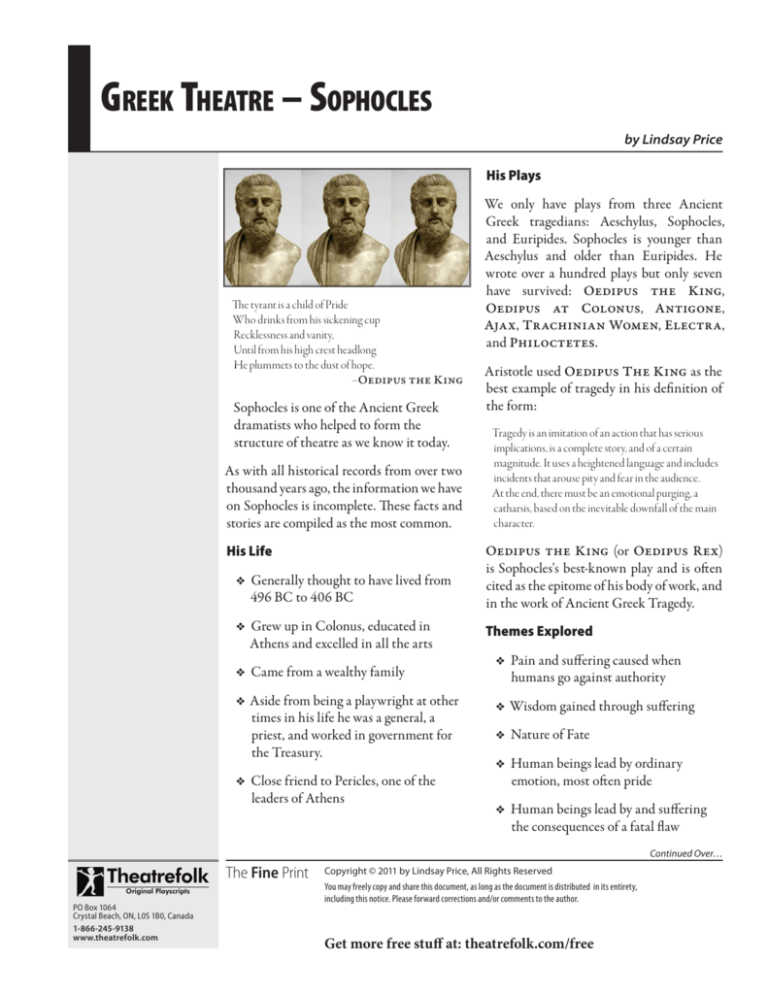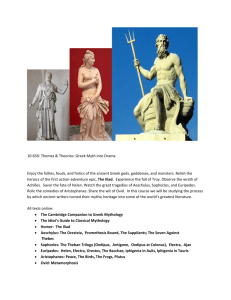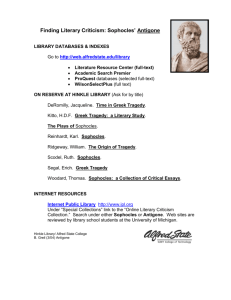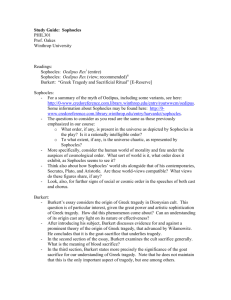
Greek Theatre – Sophocles
by Lindsay Price
His Plays
The tyrant is a child of Pride
Who drinks from his sickening cup
Recklessness and vanity,
Until from his high crest headlong
He plummets to the dust of hope.
–Oedipus the King
Sophocles is one of the Ancient Greek
dramatists who helped to form the
structure of theatre as we know it today.
As with all historical records from over two
thousand years ago, the information we have
on Sophocles is incomplete. These facts and
stories are compiled as the most common.
His Life
❖❖ Generally thought to have lived from
496 BC to 406 BC
❖❖ Grew up in Colonus, educated in
Athens and excelled in all the arts
❖❖ Came from a wealthy family
❖❖ Aside from being a playwright at other
times in his life he was a general, a
priest, and worked in government for
the Treasury.
❖❖ Close friend to Pericles, one of the
leaders of Athens
We only have plays from three Ancient
Greek tragedians: Aeschylus, Sophocles,
and Euripides. Sophocles is younger than
Aeschylus and older than Euripides. He
wrote over a hundred plays but only seven
have survived: Oedipus the King,
Oedipus at Colonus, Antigone,
Ajax, Trachinian Women, Electra,
and Philoctetes.
Aristotle used Oedipus The King as the
best example of tragedy in his definition of
the form:
Tragedy is an imitation of an action that has serious
implications, is a complete story, and of a certain
magnitude. It uses a heightened language and includes
incidents that arouse pity and fear in the audience.
At the end, there must be an emotional purging, a
catharsis, based on the inevitable downfall of the main
character.
Oedipus the King (or Oedipus Rex)
is Sophocles's best-known play and is often
cited as the epitome of his body of work, and
in the work of Ancient Greek Tragedy.
Themes Explored
❖❖ Pain and suffering caused when
humans go against authority
❖❖ Wisdom gained through suffering
❖❖ Nature of Fate
❖❖ Human beings lead by ordinary
emotion, most often pride
❖❖ Human beings lead by and suffering
the consequences of a fatal flaw
Continued Over…
Theatrefolk The Fine Print
Original Playscripts
PO Box 1064
Crystal Beach, ON, L0S 1B0, Canada
1-866-245-9138
www.theatrefolk.com
Copyright © 2011 by Lindsay Price, All Rights Reserved
You may freely copy and share this document, as long as the document is distributed in its entirety,
including this notice. Please forward corrections and/or comments to the author.
Get more free stuff at: theatrefolk.com/free
❖❖ Less about man's relationship with
the gods, but more with man's
relationships with each other.
Influenced Theatre How?
❖❖ Added a third actor
❖❖ Relied less on the chorus and more on
developing characters
❖❖ Introduced painted scenery
❖❖ Did away with the trilogy form. Each
tragedy was its own story. Antigone,
Oedipus the King and Oedipus
at Colonus are not actually part
the same trilogy, and in fact were
written out of order and produced
in different years. Antigone was
written first, Oedipus the King
second and Oedipus at Colonus
was performed after his death.
Interesting Facts
In his first competition he beat Aeschylus
(468) In subsequent competitions, he won
24 times and never placed any lower than
second. Oedipus Rex did not win the
year it competed.
Did not act in his own plays because his
voice wasn't strong enough.
There is a story that he was sued by his son
for mental incapacity. In his defence at
the trial Sophocles read from the as of yet
unperformed, Oedipus at Colonus.
He was instantly acquitted. Do you think
this is a true story?
Although there is little known about
Sophocles himself, the general thought
is that he was a good-natured man his
whole life and was very well liked. This is
mentioned in The Frogs by Aristophanes.
Dionysus describes Sophocles in the play as
“easy” (line 84) as in easy-going. And when
he died, it is described that when he came
to Hades, he did not stake claim (the chair)
as the greatest poet but gave Aeschylus
respect:
“Claim it? Not he! When he came down, he kissed
with reverence Aeschylus and clasped his hand, and
yielded willingly the chair to him." (789-791)
❧
Nothing so evil as money ever grew to be current
among men. This lays cities low, this drives men from
their homes, this trains and warps honest souls till they
set themselves to works of shame; this still teaches folk
to practise villainies, and to know every godless deed.
But all the men who wrought this thing for hire have
made it sure that, soon or late, they shall pay the price.
–Antigone












